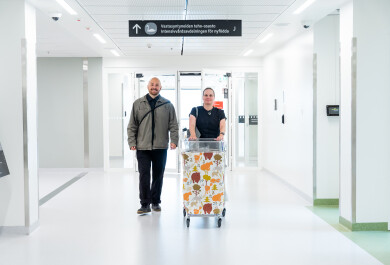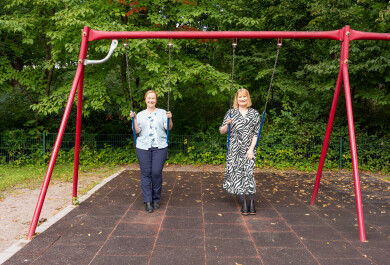Anna Aatsinki Connects the Dots between Brain and Microbiota
Doctoral Candidate, MD Anna Aatsinki is finishing her dissertation about the connection between gut microbiota and development of the nervous system. Next, she aims to study how breast milk’s composition affects infant brain – there is plenty to discover in the nascent field.
In the recent years, Anna Aatsinki, a doctoral candidate in the FinnBrain Birth Cohort Study, has unravelled the effects maternal pre-natal stress may have on the infant's microbiota and the development of gut-brain-axis communication.
In Aatsinki’s dissertation, the central question is how infant's early life microbiota connects to the different indicators of socio-emotional development. For example, in 2019 a research article related to the dissertation was published, and it stated that the microbiota of an infant’s stools is connected to their temperament.
– In this research, temperament is the mother’s description of the infant’s reactions to stimuli in their surroundings in a two-week period, and their ability to control said reactions, Aatsinki describes.
In her dissertation, Aatsinki has studied also the connections between infant’s early life microbiota and the size of the amygdala. The amygdala is the so-called fear centre, but it contributes to the controlling of many other things as well.
– Roughly speaking, it teaches us what we should learn from emotional signals. It is partially related to temperament, and could also be connected to a risk of mental disorders later in life.
Aatsinki says that infants do not have actual psychiatric symptoms, but, for example, anxiety and depression begin to develop at a later stage. The risk factors may, however, exist already at an earlier stage.
– This is why it is engaging to study these types of potential risk factors. They may predispose to the development of a psychiatric disorder if also the environmental factors are specific type for a long time.
Aatsinki is involved in the FinnBrain Birth Cohort Study's sub-study on gut microbiota, which is directed by Linnea Karlsson. Karlsson also supervises Aatsinki’s dissertation together with Leo Lahti and Eveliina Munukka.
Open Academic Community Takes Research Forward
The interdisciplinary dissertation takes strongly into account the mother’s prenatal psychological symptoms, as the thesis also concerns the effect prenatal stress may have on the infant’s microbiota. In the recent years, plenty of new data has been obtained on the connection of stress and gut microbiota.
– When you immerse yourself in a topic, it fuels your interest. The most motivating part of the gut-brain research is that the field is developing and the academic community is open. Within the research field, researchers discuss ways to conduct even better research and better conclusions.
Even though Aatsinki could not expect or hope for the research environment to be interdisciplinary, it has turned out to be a crucial part of her own experience.
– The phenomena are complex and there is literature in an abundance. It is practical for the research group to have members who can describe the context more broadly.
Currently, the research group that Aatsinki is involved in conducts research related to infant cortisol reaction and the connection between stress reaction and microbiota.
There is already some data on how the factors are linked together, for example, how the mode of delivery or antibiotics affect the development of microbiota. However, there's always room for new research. After completing her dissertation, Aatsinki wishes to direct her own research towards studying the composition of breast milk.
– I am interested in studying the connection between breast milk and infant gut microbiota, since we know that breast feeding and weaning the infant have a significant effect on the development of microbiota.
Aatsinki is particularly interested in establishing what type of connection does the composition of breast milk have with the factors related to the indicators that measure infant brain development.
– Are there factors that could cause alterations in the infant microbiota, or that could hold great importance for the child's development? Could it be that some of the alterations in breast milk are useful and some are not? What type of alterations occur if the mother suffers from anxiety or depression?, Aatsinki lists relevant questions.
Mechanisms Should Be Understood Better
When the research revealing the connection between temperament and infants' gut microbiota was published, there were hardly any other research available. The research brought new light on the association between behaviour and microbiota.
– Afterwards, a handful of other studies on early life microbiota and behavioural indicators have been published.
Research focusing on brain and microbiota itself is not a new topic. For example, lactobacillus products have been experimented with in the treatment of melancholic patients already at the beginning of the 20th century. According to Aatsinki, the field has been re-discovered in the recent years.
The developing field offers several topics for further research. To date, research where microbiota has been observed for several years has not been conducted in an abundance. Longitudinal research especially on teenagers or adults has not been carried out.
According to Aatsinki, stronger understanding of the mechanisms behind the brain and microbiota development is currently needed.
– We have plenty of research to conduct in order to understand these true mechanisms. The development of the microbiota is a complex and multifaceted process that is strongly affected by environmental factors. Also, many factors affect the brain development of an infant.
If the mechanisms were understood better, we could develop effective applications. Such applications could be, for example, probiotics or breast milk substitutes that have an impact on gut microbiota, and contain favourable elements for infant development.
In the future, a significant research question is whether gut microbiota affects mental health, and how.
– Additional comprehension of the complex, biological cause for mental health disorders is welcome. The function of the immune system and its connection to depression is understood better today, while microbiota carries an important role in the development of the immune system.
It is crucial to understand the effects microbiota has on the immune system and metabolism, and therefore on the human phenotype.
– We are at an early stage of the research, so currently we study only individual parts. At some point we can hopefully link the individual parts together.
|
Who?
|
Text: Sara Harju
Translation: Maija Siukonen
Photos: Hanna Oksanen




